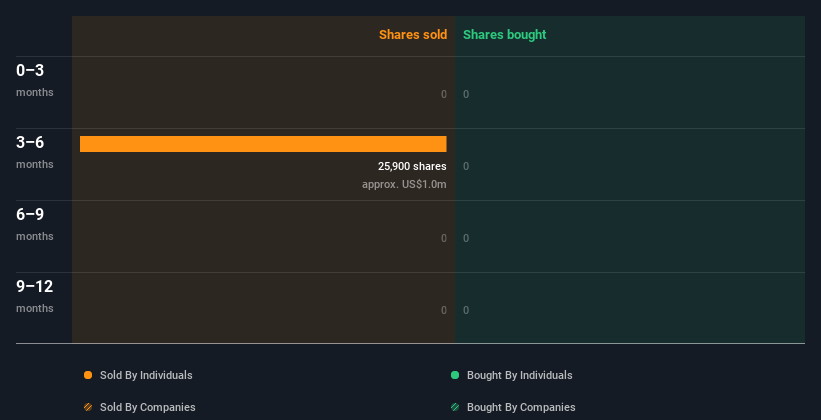- United States
- /
- Consumer Finance
- /
- NYSE:SYF
Synchrony Financial (NYSE:SYF) insiders who sold US$1.0m worth of stock earlier this year are probably glad they did so as market cap slides to US$12b

Over the past year, insiders sold US$1.0m worth of Synchrony Financial (NYSE:SYF) stock at an average price of US$39.20 per share allowing them to get the most out of their money. The company’s market cap plunged by US$503m after price dropped by 3.9% last week but insiders were able to limit their loss to an extent.
While insider transactions are not the most important thing when it comes to long-term investing, we do think it is perfectly logical to keep tabs on what insiders are doing.
Check out our latest analysis for Synchrony Financial
Synchrony Financial Insider Transactions Over The Last Year
In the last twelve months, the biggest single sale by an insider was when the Executive VP & CEO of Digital, Bart Schaller, sold US$1.0m worth of shares at a price of US$39.20 per share. While insider selling is a negative, to us, it is more negative if the shares are sold at a lower price. The good news is that this large sale was at well above current price of US$28.01. So it may not shed much light on insider confidence at current levels. The only individual insider seller over the last year was Bart Schaller.
The chart below shows insider transactions (by companies and individuals) over the last year. By clicking on the graph below, you can see the precise details of each insider transaction!

I will like Synchrony Financial better if I see some big insider buys. While we wait, check out this free list of growing companies with considerable, recent, insider buying.
Does Synchrony Financial Boast High Insider Ownership?
Looking at the total insider shareholdings in a company can help to inform your view of whether they are well aligned with common shareholders. We usually like to see fairly high levels of insider ownership. Synchrony Financial insiders own about US$82m worth of shares. That equates to 0.7% of the company. We've certainly seen higher levels of insider ownership elsewhere, but these holdings are enough to suggest alignment between insiders and the other shareholders.
So What Does This Data Suggest About Synchrony Financial Insiders?
The fact that there have been no Synchrony Financial insider transactions recently certainly doesn't bother us. Our analysis of Synchrony Financial insider transactions leaves us cautious. The modest level of insider ownership is, at least, some comfort. So these insider transactions can help us build a thesis about the stock, but it's also worthwhile knowing the risks facing this company. Be aware that Synchrony Financial is showing 2 warning signs in our investment analysis, and 1 of those is a bit unpleasant...
Of course Synchrony Financial may not be the best stock to buy. So you may wish to see this free collection of high quality companies.
For the purposes of this article, insiders are those individuals who report their transactions to the relevant regulatory body. We currently account for open market transactions and private dispositions, but not derivative transactions.
If you're looking to trade Synchrony Financial, open an account with the lowest-cost platform trusted by professionals, Interactive Brokers.
With clients in over 200 countries and territories, and access to 160 markets, IBKR lets you trade stocks, options, futures, forex, bonds and funds from a single integrated account.
Enjoy no hidden fees, no account minimums, and FX conversion rates as low as 0.03%, far better than what most brokers offer.
Sponsored ContentNew: Manage All Your Stock Portfolios in One Place
We've created the ultimate portfolio companion for stock investors, and it's free.
• Connect an unlimited number of Portfolios and see your total in one currency
• Be alerted to new Warning Signs or Risks via email or mobile
• Track the Fair Value of your stocks
Have feedback on this article? Concerned about the content? Get in touch with us directly. Alternatively, email editorial-team (at) simplywallst.com.
This article by Simply Wall St is general in nature. We provide commentary based on historical data and analyst forecasts only using an unbiased methodology and our articles are not intended to be financial advice. It does not constitute a recommendation to buy or sell any stock, and does not take account of your objectives, or your financial situation. We aim to bring you long-term focused analysis driven by fundamental data. Note that our analysis may not factor in the latest price-sensitive company announcements or qualitative material. Simply Wall St has no position in any stocks mentioned.
About NYSE:SYF
Synchrony Financial
Operates as a consumer financial services company in the United States.
Undervalued with excellent balance sheet.
Similar Companies
Market Insights
Community Narratives



